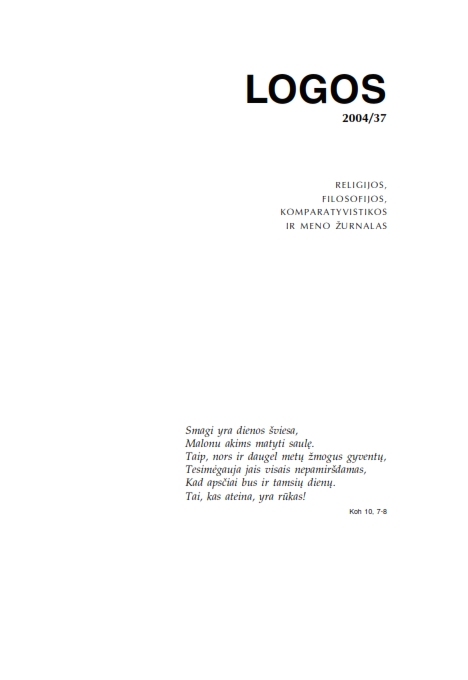Septynios Šventosios Dvasios dovanos ir jų sąveika su dorybėmis pagal šv. Tomą Akvinietį
Seven Gifts of the Holy Spirit and their Interaction with the Virtues According to St. Thomas Aquinas
Author(s): Jolita BalčiūnaitėSubject(s): Christian Theology and Religion, Ethics / Practical Philosophy, Social Philosophy, Philosophy of Middle Ages, Philosophy of Religion, Sociology of Religion
Published by: Visuomeninė organizacija »LOGOS«
Keywords: The gifts of the Holy Spirit; virtues; habit; reason; will; moral Christian life;
Summary/Abstract: St. Thomas Aquinas describes the gifts of the Holy Spirit as a help for a moral Christian life. It is through the gifts of the Holy Spirit that perfection of human nature occurs, as the gifts themselves are perfections, which incline a person to follow the inspiration of the Holy Spirit. Furthermore, this inspiration is God’s special help for a person springing from the abundance of God’s goodness. They let the Holy Spirit act in a person freely and spontaneously and are a kind of permanent right of the Holy Spirit to interfere in the life of a baptised person. Analysing the activities of each gift separately, St. Thomas Aquinas divides them into contemplative and practical, taking into consideration the powers of the human soul, i.e., the powers of reason and appetite. Thus every gift of the Holy Spirit makes perfect a certain power of the human soul so that the Holy Spirit can embrace all spheres of human activity. St. Thomas Aquinas includes the gifts of the Holy Spirit in an integral structure of virtuous life, where seven gifts of the Holy Spirit interact with seven virtues: four cardinal virtues and three divine or theological virtues. Finally, it is revealed that according to St. Thomas Aquinas, gifts and virtues act in a person differently. The gifts of the Holy Spirit, with their activity descending from God, bring human actions to perfection in a supernatural way, contrary to virtues which bring human actions to perfection in a natural way. That is why a Christian reaches his final purpose - eternal life - not only by practising virtues, but first of all by cooperation with the Holy Spirit and letting It act through Its gifts.
Journal: LOGOS - A Journal of Religion, Philosophy, Comparative Cultural Studies and Art
- Issue Year: 2004
- Issue No: 37
- Page Range: 46-54
- Page Count: 9
- Language: Lithuanian

